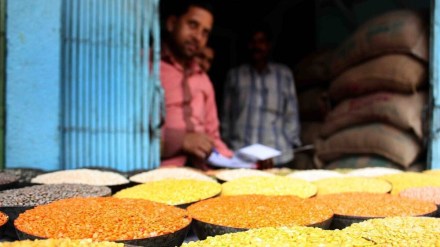Amid a shortfall in output due to unseasonal rain last year and sluggish imports, the prices of tur and urad are likely to stay elevated in the coming months despite the government imposing stock holding limits on pulses varieties, trade sources say.
Performance of the monsoon — both the pulses variety are grown in rainfed regions of Maharashtra, Karnataka, Andhra Pradesh and Telangana — and the government’s decision to monitor stock and imports would have a bearing on the price movement in coming months.
Mandi prices of tur at Latur, Maharashtra, is currently ruling around `9,700/ quintal against the minimum support price of `6,600 for the 2022-23 season (July-June).
The agriculture ministry has estimated decline of 18.3% and 3.7% de in the outputs of tur and urad for 2022-23 (July-June) at 3.4 million tonne (MT) and 2.7 MT, respectively compared to the previous crop year.
However, the trade sources have pegged the output of tur at 2.7-2.8 MT for the year because unseasonal rain in October adversely impacted standing crops in the key producing state of Maharashtra. Retail inflation in tur and urad in April 2023 was 13.73% and 3.95% respectively on year.
The country imported 0.84 MT and 0.89 MT of tur respectively in FY22 and FY23. Urad imports were 0.51 MT and 0.61 MT in FY22 and FY23 respectively. Last month, the department of consumer affairs asked pulse importers to expedite shipment of tur and urad varieties from Myanmar to improve domestic supplies. In a meeting held with importers, the department has said that if imports of pulses do not ease, the government would consider government-to-government deals with Myanmar. Sources said some importers have been deliberately slow in importing pulses from Myanmar, in their bid to jack up domestic prices.
To curb hoarding and speculation amid rising prices, the government on Friday had imposed limits on the stocks of tur and urad dal. The stock limits is applicable to a range of entities such as wholesalers to retailers, millers and importers. The order will be effective till October 31. The government has imposed a ceiling of 200 tonne per pulse type for wholesalers and five tonne for retailers, with big-chain retailers permitted five tonne at each outlet and a maximum of 200 tonne in total.
“The imposition of stock limits on tur and urad dal is another step in the consistent efforts taken by the government to crack down on prices of essential commodities,” according to an official statement.
Officials said the consumer affairs department is closely monitoring the stock position of tur and urad through a stock disclosure portal which has been reviewed on a weekly basis with state governments.
Under the bilateral agreement signed last year, India has committed to import 0.25 MT urad and 0.1 MT of tur annually from Myanmar between 2021-22 and 2025-26.
According to estimates, the country imports around 15% of its annual pulses consumption. The agriculture ministry has estimated pulses production in the 2022-23 crop year at a record 27.7 MT.
